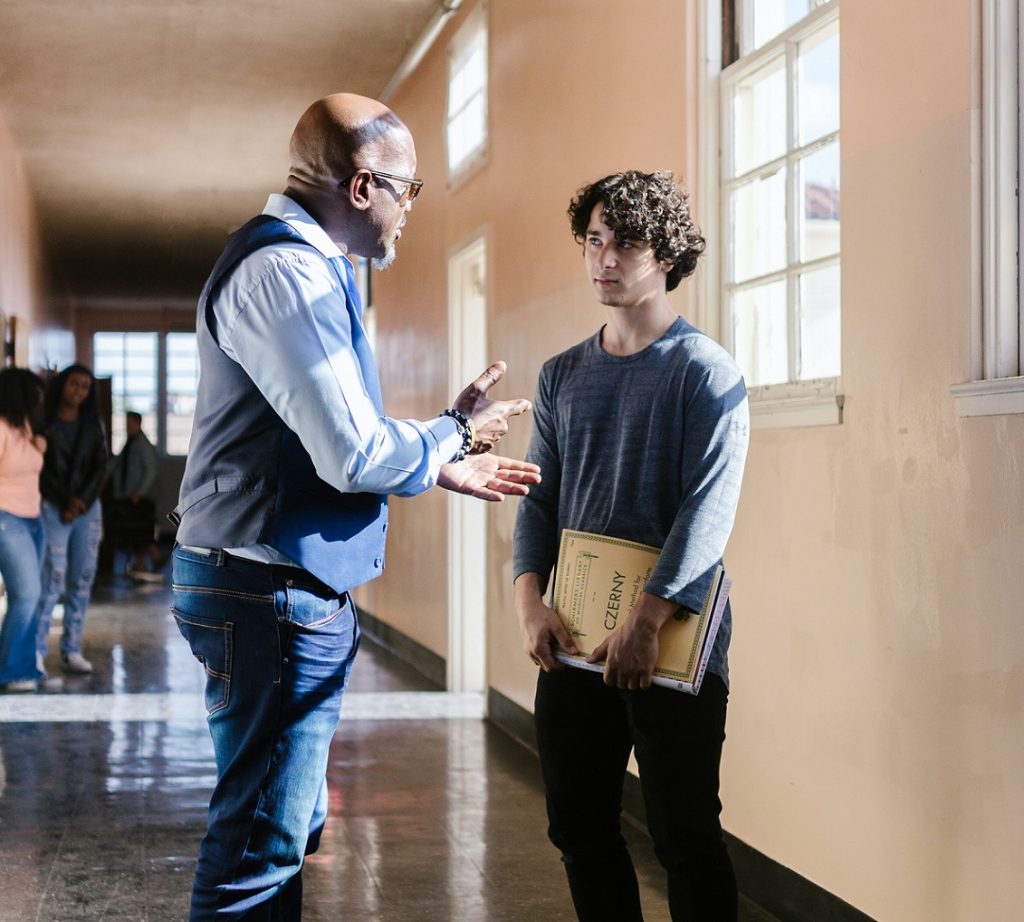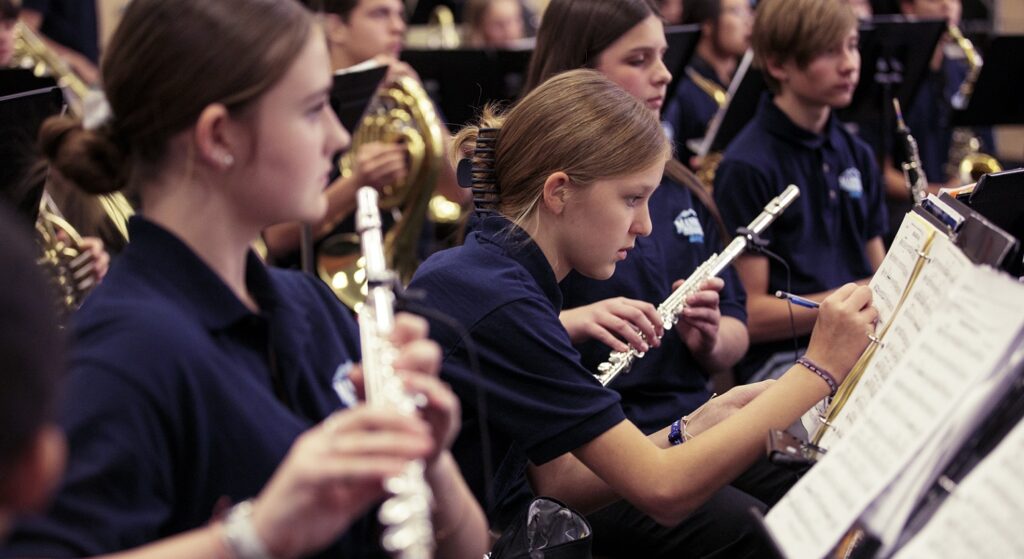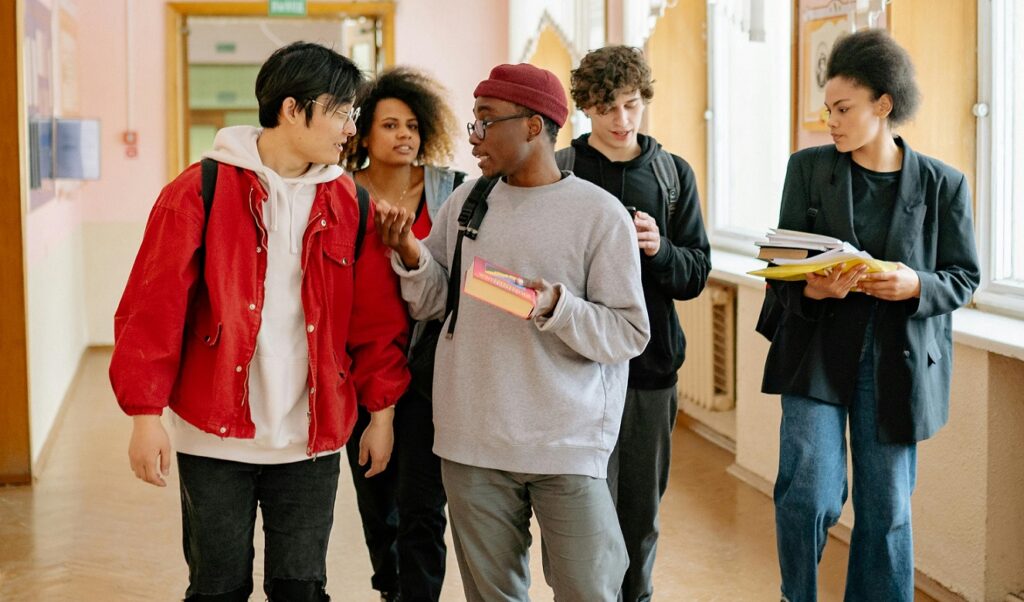10 Ways to Make Your Students’ Day
Kids are excited to see teachers who are excited to see them, so bring your A-game every day.
Students look forward to learning from teachers who are excited to teach them. When your students come to your class, your body language and interaction set the tone for the rehearsal. Are you starting your class in a way that excites kids to learn? Students take the lead from you, and they make up their minds in the first few moments of each rehearsal how things will go.
What Traits Did Your Favorite Teacher Have?
Several times growing up, I went to work with my mom, who was a high school English teacher for 30 years. Every day, she greeted her students at the door with a big smile, asking them a question about their day or checking in on something that had happened the day before like how an athlete’s game went or another student’s improvement on a recent assignment. Her smile never seemed forced, even though I know now how much she was dealing with — raising me and balancing her job responsibilities. I appreciate how hard my mom worked to connect with her students and lift their spirits.

When I started teaching at Claudia Taylor “Lady Bird” Johnson High School in 2008, I met Bernard Rosenberg, the band director at Tejeda Middle School. Everyone described him as a Pied Piper because there were more than 350 students who loved participating in his band program. When I went to his rehearsals, I watched his interaction with students. He made kids laugh, he made them feel like rock stars, and he could brighten up the day of every human who walked into his classroom.
After rehearsals, he would sometimes sink into his chair, exhausted and even a bit frustrated — it was a total 180 from what I had witnessed just moments before. It was a learning experience to see how Bernard worked tirelessly to improve his students’ day, even on days when he was struggling. Even administrators would visit his classroom just to find a moment of positive energy in their day.
I realized that we all went to Bernard because he made us feel like we were the most important person in his life at that moment. And, boy, was he excited to see us. I know he wasn’t always as joyful as he let on, but he prioritized shining brightly in the lives of those he served. Because of this, he had his students in the palm of his hands.
My mom’s students probably don’t remember much about grammar, passive voice, “Hamlet” or “To Kill a Mockingbird,” but I bet they all remember her as someone who was always excited to “make their day.” Mr. Rosenberg recently retired from Tejeda, and it was incredible to see the outpouring of students return to celebrate him or send letters about his impact on their lives. Both my mom’s and Bernard’s total investment in their students’ overall well-being remains one of the most powerful things I have ever witnessed.
What Traits Do Your Favorite Students Have?
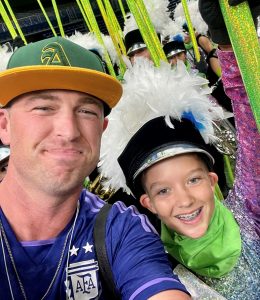 My favorite students are those who are always enthusiastic or engaged during my rehearsals, even when I knew they didn’t want to be there. The kids who made it easy for me to teach when maybe I didn’t want to be there. Kids tend to see their teachers as superhuman and expect us to always be at our best. On my most challenging days, the few kids who went out of their way to smile and say good morning or check in with me, made all the difference.
My favorite students are those who are always enthusiastic or engaged during my rehearsals, even when I knew they didn’t want to be there. The kids who made it easy for me to teach when maybe I didn’t want to be there. Kids tend to see their teachers as superhuman and expect us to always be at our best. On my most challenging days, the few kids who went out of their way to smile and say good morning or check in with me, made all the difference.
I realized that many students, however, were nervous to say hello or make eye contact, and as their teacher, it was important for me to open the door and initiate the process. Sometimes, my insecurities would get in the way. I would assume that if they didn’t seem to be in good spirits, they might not want to be there. Truthfully, sometimes they didn’t. And still, as the coach, I needed to figure out a way to motivate them and move our team forward.
Our programs mirror our personalities. Kids pick up on our mannerisms and temperament, and they learn by watching. The more we exercise compassion and patience, the more they will demonstrate those traits. We can teach them best through daily interactions, including how we greet them and welcome them into the classroom each day. Remember, students are a reflection of their directors.
Kids Will Give Back 60% of the Energy You Exert
Every teacher wants their class to be the most important one to their students. However, teachers must remember that students usually take six subjects, and they face expectations from six instructors, each competing for their energy, effort and attention. While entering your class in the morning, a student may have been up late working on a project for English, knowing that after your class, they have a math test that they’re not feeling well prepared for. Likewise, if your class meets later in the day, they may have come from a test that went poorly after a long night of working on college admission essays.
We want our students to bring 100% to every rehearsal, but the reality is that we don’t bring 100% to every rehearsal. One of my colleagues, Manny Maldonado, used to say, “Kids will give back 60% of the energy you do.”
I always keep this in mind when I teach. I always tell myself, “If it is to be, it is up to me.”
It’s difficult to expect kids to give more energy than we do, and even then, they won’t always match what is coming from the podium.
“Checking the Microphone”
At the Boston Crusaders, Gino Cipriani, the assistant director and brass caption head, begins each “Brass Stadium” rehearsal with a simple microphone test to ensure the students and staff on the field can hear his instructions from the MegaVox in the press box or on the tower. The normally mundane “Mic check, test 1-2, test 1-2-3” has evolved into a daily positive ritual over the last two to three seasons.
 I remember how it started in 2021 during the post-COVID re-boot. We were all looking for ways to boost morale and confidence. At a rehearsal early on during spring training, Gino tested the microphone. The kids couldn’t hear it from the field, so they started to scream “What?! What?! What?!” until Gino yelled, “Checking the microphone!” at a volume they could hear. They all cheered and screamed exuberantly.
I remember how it started in 2021 during the post-COVID re-boot. We were all looking for ways to boost morale and confidence. At a rehearsal early on during spring training, Gino tested the microphone. The kids couldn’t hear it from the field, so they started to scream “What?! What?! What?!” until Gino yelled, “Checking the microphone!” at a volume they could hear. They all cheered and screamed exuberantly.
The next day, before Gino could even turn the mic on, the kids started to scream, “What?! What?! What?!” as if to goad him to check it. This trivial interaction between the horn line and Gino turned into a tradition that begins every rehearsal — even our hottest, most challenging ones — with a burst of positive energy. The kids give Gino little choice but to be excited to see them, and they know that he is. They pull it out of him, and he draws similar great energy out of them.
Before this routine started, the beginning of rehearsals in 100-degree Alabama or rainy Vermont would feel slow or even a bit depressing. Thanks to this simple interaction, we all share a moment of joy that puts us in the right mindset for rehearsal.

10 Ways to “Make Their Day”
The FISH! Philosophy, modeled after the Pike Place Fish Market in Seattle, is a business technique aimed at creating happy individuals in the workplace. One of the principles of Fish! is “Make their day.” It is the idea of finding “simple ways to serve or delight people in a meaningful or memorable way,” according to its website.
Here’s how I incorporate FISH! into my daily routine.
 Greet your students daily — at the door or before your rehearsals. Say, “Good morning” or “Good afternoon” while making excellent eye contact, smiling and projecting. If students don’t respond, don’t take it personally. Teenagers mumble. You can inspire them to respond with your energy or teach them to respond.
Greet your students daily — at the door or before your rehearsals. Say, “Good morning” or “Good afternoon” while making excellent eye contact, smiling and projecting. If students don’t respond, don’t take it personally. Teenagers mumble. You can inspire them to respond with your energy or teach them to respond.- Greet individual students by name and by making eye contact. Students appreciate hearing their names and knowing you care enough to learn them. If you’re not good at learning names — you’re not alone — don’t give up. Try learning last names if it helps or even first letters.
- Get to know what your students participate in outside of band. Are they in choir, theater or athletics? Ask them how these events are going. If you can attend their outside events to support them, do so.
- Find common ground with difficult students. If a student feels like every time they come into your class, you’re disciplining them or getting on them, they won’t be excited to see you. Reflect on patterns of interactions and turn a negative relationship into a positive one for both you and the student.
- Consider not starting the day with e-mails. Get to work, visit with colleagues, score study and listen to your rehearsal recordings. E-mail is a literal vacuum that can suck you in. If you put your energy into colleagues and students, you may find that it energizes you. At Boston Crusaders, our staff starts each day with “coffee and conversation.” This quiet time allows us to talk through the day and bond with one another.
- When you are struggling, learn to take time for self-care. You can’t be uplifting for students if you can’t lift up yourself.
- Recognize the triggers that take away your joy and avoid starting your day with them or learn how to manage them before a rehearsal. Try to structure your day, so you have more joy to give away to others.
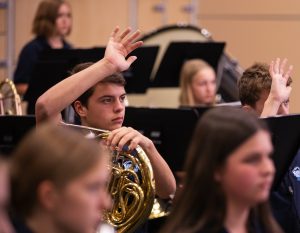 If a normally cheerful student looks sad or is acting out of sorts, take a second to investigate. “Hey, you normally answer many questions in rehearsal, but you seemed quiet today. Is everything ok?” When students have bad body language in rehearsals, don’t assume it’s a response to you, the rehearsal or even that the student realizes they have bad body language. We can help students learn the power of their body language through coaching and raising awareness.
If a normally cheerful student looks sad or is acting out of sorts, take a second to investigate. “Hey, you normally answer many questions in rehearsal, but you seemed quiet today. Is everything ok?” When students have bad body language in rehearsals, don’t assume it’s a response to you, the rehearsal or even that the student realizes they have bad body language. We can help students learn the power of their body language through coaching and raising awareness.- Recognize when you are having a bad day and avoid projecting your frustration onto your students. Students pick up on your energy. We can’t always be superheroes, but it’s important to shield students from our negative moments. I can’t tell you the number of times I had an issue with an administrator or a parent spill over into my rehearsal. I still have to remind myself every rehearsal to stay positive.
- As my friend Chad Dempsey, band director at Edinburg North, likes to say, “If you’re having a bad day, there’s still time to turn it around. If you’re having a bad week … there’s still time to turn it around.”
“Kids Don’t Learn from People They Don’t Like”
In one of my favorite Ted Talks, educator Rita Pierson says, “Kids don’t learn from people they don’t like” to a room full of educators who chuckle somewhat grudgingly.
Clearly, we won’t like everyone in this world. In fact, we won’t like all our bosses or our colleagues, but we learn to work through this.
For our students, these are formative years. They’re more apt to learn from a teacher whose class they enjoy going to. When Pierson says, “Your toughest students are never ever absent,” you can hear the teachers in the audience roar with laughter. She reminds us to be “great actors” so that those students never know we may not be excited to see them.
We have the gift to make every day a good day for our students. Make the most of this gift this school year!











